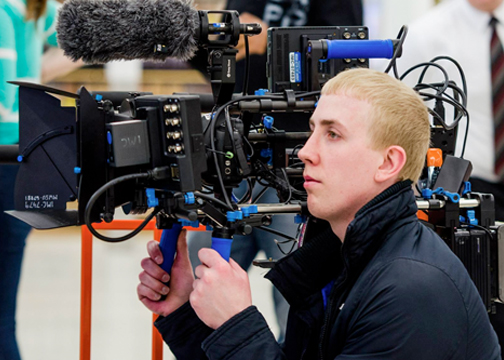The Bachelor of Applied Arts in Performing & Cinematic Arts is a production-heavy program that incorporates both traditional film practices and current industry visual effects, providing a complete modern digital cinema degree.
Graduates will complete the program with a thesis-level film and a portfolio that reflects the career they wish to specialize in.
Careers
Develop the skills you need to specialize in any film industry discipline. You will build a portfolio that reflects the career you are looking for:
- Directing
- Cinematography
- Editing
- Screenwriting
- Producing
- Audio
- Visual Effects
- Compositing
- Matte Painting
- Script Supervising
- Visual Effects Supervising
- Creative Producing
Hands-on Learning Opportunities
Production Participation: Cinema requires a large number of creative minds to produce a modern film. Students enrolled in this program will enjoy a highly collaborative creative environment. Starting around the second year, students are required to enroll in Production Participation two times. During this course, students will work on upper-level thesis films while learning from peer mentors. When these students reach their upper-level thesis class, they will in turn have a cadre of underclassmen to work on their film, while mentoring them.
Old Saint Jo: A community-based video production opportunity focused on documenting the rich history of Old Saint Jo through the use of social media. With the help of our community, staff, and interns, students interview, document, and create content for global viewing. Many students participate in this production as their internship which allows them to build portfolio content dedicated to their desired industry interest. For more information, contact Professor Lawrence at tlawrence7@missouriwestern.edu.
Griffon Production House (GPH): This applied learning opportunity provides students with real-world experience in multi-cam productions both on and off-campus. Clients include Missouri Western Music Programs, along with other campus organizations. Students will also work with community organizations as well, such as the St. Joseph Youth Chorale. Students participating in GPH will plan, produce, edit, and master industry quality products that will serve the needs of the client. This provides students with resume building experience, as well as content for their reel, and networking opportunities. Students at all levels of experience are encouraged to participate with GPH. For more information, contact Professor Lawrence at tlawrence7@missouriwestern.edu.
Griffon University: Students work with both faculty and the community to create interesting video content on topics of interest to the public. Productions provide students with industry-relevant content and opportunities. Intraprofessional collaboration is emphasized as students will coordinate and collaborate with animation, marketing, and journalism students to produce these films. For more information, contact Professor Lawrence at tlawrence7@missouriwestern.edu.


